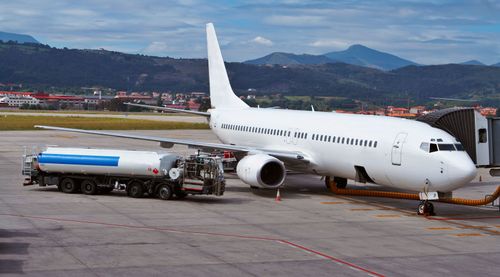European court dismisses challenge to treatment of crop-based biofuels in EU SAF regulations

February 28, 2025
BY Erin Voegele
The General Court of the European Union on Feb. 27 dismissed a challenge against the ReFuelEU Aviation regulations brought by European biofuel producers last year regarding regulation’s exclusion of crop-based fuels.
The Council of the European Union in October 2023 adopted regulations for the ReFuelEU initiative. The law aims to boost both the demand for and supply of sustainable aviation fuel (SAF) within the European Union.
ReFuelEU is part of the Fit for 55 package, which is the European Union’s plan to reduce greenhouse gas (GHG) emissions by at least 55 percent by 2030 when compared to a 1990 baseline and to reach net-zero by 2050.
Advertisement
The ReFuelEU aviation rules require EU airports and fuel suppliers to ensure that at least 2% of aviation fuels are “green” by 2025. The requirement ramps up to 6% in 2030, 20% in 2035, 34% in 2040, 42% in 2045, and 70% in 2050. The rules also require a proportion of the fuel mix to be comprised of synthetic fuels, such as e-kerosene. The requirement for synthetic fuels is set at 1.2% in 2030, 2% in 2032, 5% in 2035 and progressively reaches 35% in 2050.
The regulations have been criticized by many in the biofuels industry for the exclusion of crop-based aviation fuels. ePURE, the European renewable ethanol association, and European biofuel producer Pannonia Bio Zrt filed a lawsuit in February 2024 charging that the RefuelEU Aviation improperly exclude crop-based biofuels from the effort to reduce greenhouse gas (GHG) emissions from air transport.
The Renewable Fuels Association, Growth Energy, the U.S. Grains Council and LanzaJet in May 2024 sought to intervene in the challenge in support of ePURE and Pannonia Bio.
Advertisement
The General Court of the EU on Feb. 27 ruled that ePURE and Pannonia Bio did not have a legal right to bring the challenge. Because the underlying challenge was dismissed, the objections to the EU regulations raised the RFA, Growth Energy, USGC and LanzaJet were not considered by the court.
“We are disappointed by the Court’s decision and strongly disagree with its finding that biofuel producers in the EU and United States—who manufacture the renewable fuels that become SAF—are somehow not harmed or affected by the EU’s unfair and unscientific SAF requirements,” the U.S. groups said. “We will continue exploring options with our partners in Europe to address the biased nature and punitive effects of the ReFuelEU Aviation regulation.”
RFA also petitioned the Court to intervene in a separate challenge brought by EU producers against the FuelEU Maritime regulation, which similarly blocks crop-based biofuels from participating in the EU’s regulatory program to decarbonize maritime fuels. The underlying challenge to the FuelEU Maritime regulation—and RFA’s petition to intervene—were also dismissed by the Court on Tuesday.
Related Stories
The USDA significantly increased its estimate for 2025-’26 soybean oil use in biofuel production in its latest World Agricultural Supply and Demand Estimates report, released July 11. The outlook for soybean production was revised down.
The U.S. Energy Information Administration maintained its forecast for 2025 and 2026 biodiesel, renewable diesel and sustainable aviation fuel (SAF) production in its latest Short-Term Energy Outlook, released July 8.
XCF Global Inc. on July 10 shared its strategic plan to invest close to $1 billion in developing a network of SAF production facilities, expanding its U.S. footprint, and advancing its international growth strategy.
U.S. fuel ethanol capacity fell slightly in April, while biodiesel and renewable diesel capacity held steady, according to data released by the U.S. EIA on June 30. Feedstock consumption was down when compared to the previous month.
XCF Global Inc. on July 8 provided a production update on its flagship New Rise Reno facility, underscoring that the plant has successfully produced SAF, renewable diesel, and renewable naphtha during its initial ramp-up.
Upcoming Events










